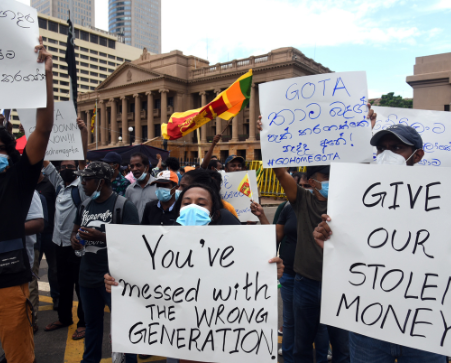
Sri Lanka seems somewhat calmer for the moment, or so it appears after almost nine months of public protests and political unrest. A crisis of debt and subsequent financial, social, and political uncertainty engulfs the country. With depleted foreign reserves, the news of default on debt payment is not a surprise. Access to essential imports, including food items, medicine, and gas remains severely limited. Many citizens must wait hours for power and days for gas. These daily challenges, combined with drastic increases in inflation, severe shortages of essential items, and mobility restrictions are compelling even the most patient Sri Lankans to take a stand and make their voice heard through democratic means. They are using social media to organize and coordinate, a reminder of the Arab Spring style of mobilization. They are participating in polls. They have also protested in the streets, and while at it, sang songs, played music and danced, to celebrate a small victory or to inspire persistence in the face of a setback.
As I observed people’s protests in Sri Lanka, I read through Twitter threads and Facebook posts of Sri Lankans who wrote in English. A big shout out to each and every one of you: Thank you for educating us! The experience was, to say the least, humbling. I was taken aback by the patience, persistence, sense of purpose, and above all, sense of hope that defined the spirit of these public protests.
The most endearing however, was a profound sense of confidence that protestors radiated as a collective. They knew and demonstrated that informed public opinion is an important player in the Sri Lankan dynamics and that credibility in people’s eyes is the currency of the day. The participation of informed urban middle-high class households was a defining factor that distinguished these protests from the previous ones. And although there were instigations of violence by certain groups, the call for purposeful calm stood popular and strong.
But Sri Lanka is in for a long and rough ride. While changes in the political leadership may facilitate political stability, the country’s economic woes are far from over. And although the concept of reforms sounds like a breath of fresh air, especially if they are packaged together with promises of those posing as saviors, the actual process of carrying the burden of reforms is going to be long and arduous.
On the path to a possible rebirth, at least as far as the management of public finances is concerned, Sri Lanka will need all the support it can get in the weeks and months to come. Looking at the enabling role that access to information on public finance has played in building awareness, it will be absolutely critical to, not only sustain this access, but to further enhance and enrich it.
As Sri Lanka steps on the path to reform, people’s level of access to accurate and reliable information on the process will determine their level of support and commitment to reform. Their access to processes of decision making and ability to monitor the pace of results of those decisions will help them act as informed and active participants, as opposed to passive consumers of decisions made about their lives. This access will also enable them to distinguish between evidence-based decision-making versus wishful thinking or disinformation. Disastrous economic policies and mismanagement of public finances put Sri Lanka in this crisis. Evidence-based economic policies and transparent public financial management will be central to helping the country overcome the crisis.
In Sri Lanka, the path to reform goes through public engagement. The path to gaining people’s trust goes through credible and fact-based decision-making approaches and practices. And the prerequisite for that is a strong commitment to facilitating and ensuring easy access to credible information, raising awareness, and building capacity and resilience by gathering, organizing, and presenting information on public finance and overall governance in easy-to-understand language and format. To the Sri Lanka that is preparing to stand on its own feet again, this support will be central.
CIPE Senior Program Officer Aarya Nijat manages a portfolio of projects in South Asia with a thematic focus on democratic governance, enterprise ecosystems, anti-corruption, and business advocacy. Most are implemented through partnering with local private sector and civil society organizations. Read her full bio here.
Published Date: August 01, 2022
